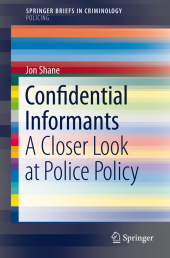 Neuerscheinungen 2015Stand: 2020-02-01 |
Schnellsuche
ISBN/Stichwort/Autor
|
Herderstraße 10
10625 Berlin
Tel.: 030 315 714 16
Fax 030 315 714 14
info@buchspektrum.de |

Jon Shane
Confidential Informants
A Closer Look at Police Policy
1st ed. 2016. 2015. xxiii, 112 S. 1 SW-Abb., 7 Tabellen. 235 mm
Verlag/Jahr: SPRINGER, BERLIN; SPRINGER INTERNATIONAL PUBLISHING 2015
ISBN: 3-319-22251-1 (3319222511)
Neue ISBN: 978-3-319-22251-6 (9783319222516)
Preis und Lieferzeit: Bitte klicken
While confidential informants (CI´s) can play a crucial role in police investigations, they also have the potential to cause great harm if they are dishonest. The process by which police agencies qualify a CI to work and the strength of agency policy may be the source of the problem. This Brief examines the integrity problem involving CIs in police operations within the United States, provides an overview of pitfalls and problems related to veracity and informant integrity including the difficulties in detecting when a CI is lying, and compares the provisions of actual published police policy to the model CI policy published by the International Association of Chiefs of Police (IACP). The analysis shows a wide divergence between actual police policy and the national standard promulgated by the IACP.
The Brief provides policy recommendations for improving use of CIs that can potentially reduce or eliminate integrity problems that can lead to organizational accidents such as wrongful arrests and convictions, injuries or deaths. Some Courts have issued measures to ensure that information received from CIs is reliable by examining sworn testimony and documents related to their work. However, as this Brief explores, this judicial effort arises only after a police operation has taken place, and the use of force - even deadly force-has already been employed. The author proposes integrity testing beforehand, which would allow police to have a greater understanding of a CI´s motivation, ability and veracity when conducting law enforcement operations. In addition, there are aspects of police policy that can enhance CI management such as training, supervision and entrapment that can further guard against integrity problems. Although integrity testing is not flawless, it does interpose an additional step in the CI management process that can help guard against wrongful conviction and perjury that harms the judicial process.
Preface.- Foreword I Mary Nicol Bowman .- Foreword II Jennifer Bonjean .- Foreword III Karen L. Amendola .- Introduction.- Background and the Problems Surrounding Confidential Informants.- Literature Review.- Methodology.- Analysis and Findings.-Discussion.- Policy Implications.- Limitations.- Directions for Future Research.- Afterword James M. Doyle .
Jon M. Shane is an Associate Professor in the Department of Law, Police Science, and Criminal Justice Administration. He retired from the Newark Police Department after 20 years at the rank of captain. Dr. Shane has published in leading criminal justice and policing, including Crime Science, Journal of Criminal Justice,Justice Quarterly, Policing: An International Journal of Strategies and Management,and Police Practice and Research. He is the author of What Every Chief Executive Should Know: Using Data to Measure Police Performance (2007, Looseleaf Law Publications) and Learning From Error: A Case Study in Organizational Accident Theory. Dr. Shane is a graduate of the 193rd session of the FBI National Academy and a graduate of the 25th session of the Senior Management Instit
ute for Police (SMIP) held by the Police Executive Research Forum at Harvard´s John F.Kennedy School of Government. He also holds a certification in non-profit management from Rutgers Graduate School of Public Administration. Prior to coming to John Jay College, he was a lecturer at Rutgers University --Newark campus and at Fairleigh Dickinson University --Teaneck (NJ) campus, where he taught courses in policing and criminal justice. He is currently a senior research associate for the Police Foundation, Washington, D.C. and a subject matter expert for the Center for Problem Oriented Policing. Some of his most recent work (2013-2015) includes providing technical assistance to the Uruguay National Police on criminal investigations and solvability factors as they transition from an inquisitorial model of criminal justice to an adversarial model. His current research focus is police policy and practice issues and crime control through problem-oriented policing, situational crime prevention and environmental criminology. Professor Shane can be reached at jshane@jjay.cuny.edu or jmsnpd@gmail.com.


